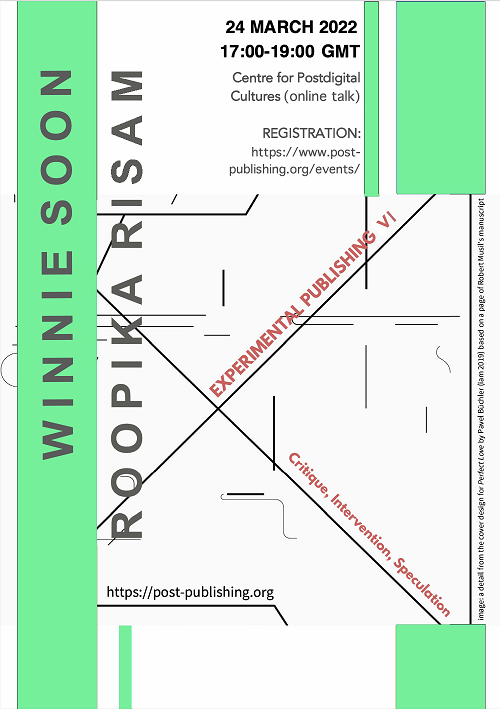A symposium with talks by Winnie Soon (Aarhus University) and Roopika Risam (Salem State University)

Registration (free): https://www.eventsforce.net/cugroup/744/home
This is the sixth in a series of symposia hosted by the Centre for Postdigital Cultures (CPC) exploring contemporary approaches to experimental publishing. Over the course of the series, we will ask questions about the role and nature of experimentation in publishing, about ways in which experimental publishing has been formulated and performed in the past, and ways in which it shapes our publishing imaginaries at present. This series aims to conceptualise and map what experimental publishing is or can be and to explore what lies behind our aims and motivations to experiment through publishing. As such, it forms the first activity within the CPC’s Post-Publishing programme, an initiative committed to exploring iterative and processual forms of publishing and their role in reconceptualising publishing as an integral part of the research and writing process, i.e. as that which inherently shapes it.
Speakers
Born and raised in Hong Kong, Winnie Soon is an artistic coder and researcher interested in queering the intersections of technical and artistic practices, engaging with topics like queer code and coding, digital censorship, experimental diagramming and software publishing. Researching in the areas of software studies and computational practices, Winnie is the co-initiator of the art community Code & Share [ ] and they are the author of two books titled “ Aesthetic Programming: A Handbook of Software Studies” (with Geoff Cox) and “Fix My Code” (with Cornelia Sollfrank). They are also the co-editor of the Software Studies Book Series (MIT Press). Winnie is currently based in Denmark and working as Associate Professor at Aarhus University. More: http://siusoon.net/
Roopika Risam is Chair of Secondary and Higher Education and Associate Professor of Education and English at Salem State University. She is the author of New Digital Worlds: Postcolonial Digital Humanities in Theory, Praxis, and Pedagogy. Risam is also co-editor of The Digital Black Atlantic, South Asian Digital Humanities, and Intersectionality in Digital Humanities. Among her projects, she co-edits the journal Reviews in Digital Humanities, which peer reviews digital scholarly outputs, with Jennifer Guiliano, and co-directs Reanimate, an intersectional feminist publishing collective, which publishes digital editions of writing by women and women of color in media industries, with Carol Stabile. Risam is co-vice president of the Association for Computers and the Humanities, with Quinn Dombrowski, and directs the Digital Ethnic Futures Consortium (DEFCon), a network for teaching and research at the intersections of digital humanities and ethnic studies, which is funded by the Andrew W. Mellon Foundation.
Concept
Experimental publishing can be positioned as an intervention, a mode of critique, and a tool of speculation. It is a way of thinking about writing and publishing today that has at its centre a commitment to questioning and breaking down distinctions between practice and theory, criticality and creativity, and between the scholarly and the artistic.
In this series of events we propose to explore contemporary approaches to experimental publishing as:
- an ongoing critique of our current publishing systems and practices, deconstructing existing hegemonies and questioning the fixtures in publishing to which we have grown accustomed—from the book as a stable object to single authorship and copyright.
- an affirmative practice which offers means to re-perform our existing writerly, research, and publishing institutions and practices through publishing experiments.
- a speculative practice that makes possible an exploration of different futures for writing and research, and the emergence of new, potentially more inclusive forms, genres, and spaces of publishing, open to ambivalence and failure.
This take on experimentation can be understood as a heterogeneous, unpredictable, and uncontained process, one that leaves the critical potentiality of the book as a medium open to new intellectual, political, and economic contingencies.

Leave a Reply
You must be logged in to post a comment.